The following contains spoilers for The Nevers S1E3, “Ignition.”
I closed my thoughts on the pilot episode of The Nevers by suggesting that the show might turn out to be a nuanced exploration of various issues endemic to modernity, or it might turn out to be a muddled mess. After S1E2, I was very hopeful that it would be the former. I perhaps even began to believe it. But S1E3 (“Ignition”) has me worried The Nevers will be even more messy and more muddled than I’d feared. It’s easy enough to guess that shake-ups behind the scenes fed into this, so I do want to be absolutely clear that I fully support the decision to part ways with Joss Whedon. One can only hope that Episode 3 will retrospectively appear as a bump in the road and for a course correction in the remaining three episodes of the show’s inaugural run.
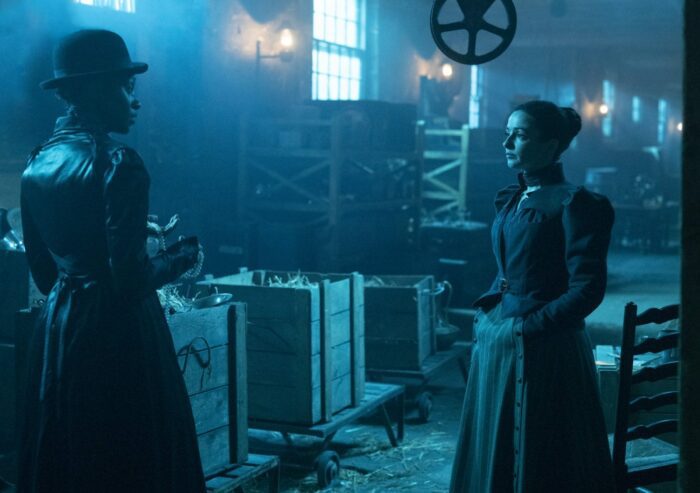
From the cold open, the tone of S1E3 feels off. It’s too light and glancing in a way that is exacerbated by the pacing of the episode, which always feels just a step too fast. Lines aren’t given room to breathe and thus fail to land. Instead of witty repartee, the dialogue feels like it is trying too hard. And—worst of all—this feeds into a feeling that these somehow aren’t quite the same people we’ve come to know the past two weeks. It feels almost as though an episode is missing.
Of course it’s not as though we were given a lot of backstory about our characters in the first two episodes of The Nevers. They nonetheless had a way of feeling real, whereas S1E3 risks reducing them to tropes. And it sucks the mystery out of getting to know them as they practically speak those tropes in their uttered lines. In talking to Mary, Amalia practically says, “yes I have secrets, here’s why and here are some of them,” and that is simply not the kind of thing that any real person would be likely to say, much less one who truly has secrets. It’s a bit as though “Ignition” takes the outline of a story and directly puts it on our screens, taking notes about character beats and putting them into the characters’ mouths to make sure we get it.
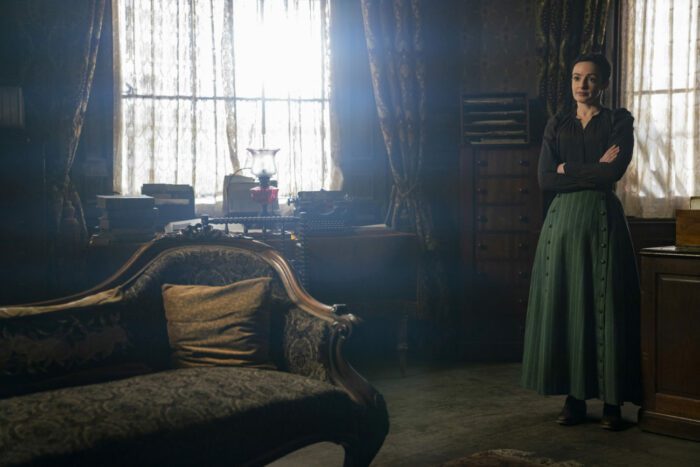
Perhaps if we focus on that outline and the content of S1E3 we can assess the state of The Nevers on the basis of the story it is trying to tell. And indeed, there are moments in “Ignition” that at least feel like they should be powerful, such as Mary’s unexpected death. The Touched from the orphanage have gathered in the park to hear her sing, with her voice amplified through a device Penance has created (let’s not focus on the bad jokes about its name). The song is one of hope and comfort, intended to beckon the Touched to safety and solidarity.
Of course, earlier in the episode Mary voiced hesitation about singing this song for this purpose because she wasn’t sure what Mrs. True’s mission really was, and I can’t say that her change of heart feels motivated by the time it occurs. Indeed, the one secret that it would have made sense to have Amalia True tell in this episode, S1E3 seems at pains to keep hidden. After all, towards the end of “Exposure,” Amalia was about to loop Penance in about her history with Maladie before Penance told her to focus on recuperating for the moment. But all we learn about this in “Ignition” is that Dr. Cousens is somehow involved, and there are some oblique references made in his conversation with Maladie to further indicate that it has something to do with the asylum.
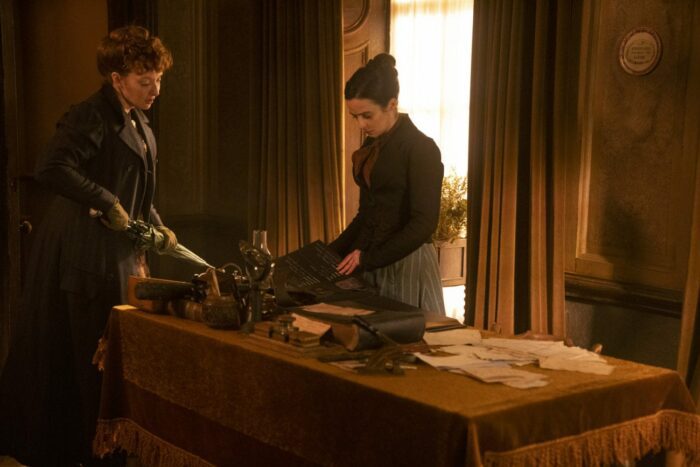
This would be the obvious guess, of course, as to where it was that Amalia betrayed Maladie/Sarah, and it was already the obvious guess from their exchange in S1E2. At this point it feels like The Nevers is simply withholding confirmation of this for the sake of doing so. It isn’t really a mystery and it won’t be satisfying when our hunch is confirmed. One hopes there is more to it, but still the elliptical dialogue with regard to this issue feels somehow as forced as the overly expositional dialogue in other parts of the episode.
It seems like this must relate to Amalia’s mission in such a direct way that it has to remain obfuscated to keep that mystery alive, and just in case you weren’t asking yourself that question enough already, S1E3 has a scene wherein Frank Mundi and Hugo Swann wonder about it at length. It’s not entirely clear what exactly is supposed to be making us question that her motives are altruistic other than these lines and those from the mouths of other characters. I would be tempted to mark these down to antipathy towards Mrs. True, and perhaps misogyny more generally, if it weren’t so clear that she is in fact hiding something. And she touches her face while looking in the mirror, because, you know, that is probably not her real face. Make sure not to forget about that.
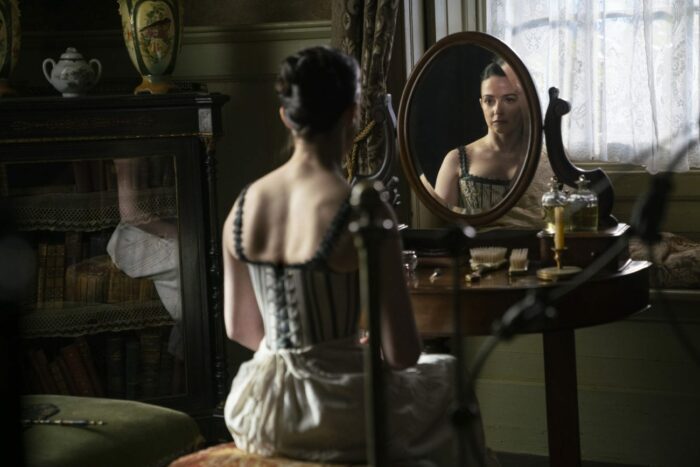
“Ignition” gives us very little in the way of story development when it comes to Lord Massen. He’s having a telephone installed in his home, even though he hates it and takes the opportunity to lament that change isn’t necessarily progress. It’s an interesting note, actually, to consider how technology has increasingly led us to give up privacy, but S1E3 seems less invested in continuing to flesh out the old reactionary who just might be right about some things even though we don’t want him to be, and more interested in suggesting that he’s pretending his daughter is dead while keeping her locked in a dungeon because she’s Touched.
Of course I’ve thought of him as a villain since his introduction in the pilot, but there seemed to be nuance to Massen. Now The Nevers seems to want to unfold those layers of his character and lay them out flat on the table. It’s a bit boring.
And the same could be said with regard to Hugo Swann, who has heretofore struck me as an intriguing figure on the line between representing something debauched and some possibility of sexual liberation. But The Nevers S1E3 moves in the direction of characterizing his actions as purely exploitative, even as the door is left open somewhat to thinking that his employees are coming to him of their own free will. I suppose it was already in the background, as we learn in “Ignition” that Hugo was behind the raid of the orphanage that occurred in “Exposure” and wants Mundi to bring him more of the Touched to work in his brothel. But it’s a bit disappointing, nonetheless, to see him “auditioning talent”—is the message here still sex-positive? You tell me.

Myrtle finds a flier like the one Beth had in S1E2 and this leads Amalia and Lucy to the address where Beth was kidnapped. We discover that the guys with weird masks are kind of robots apparently, and the woman who had been running the house drowned her daughter in a bathtub because of her turn. Changing wine into water = Satanic I guess, because Jesus did the opposite?
By this logic (which should absolutely be rejected, to be clear), the man who tries to kill Amalia after she tells Ms. Bidlow about the trap would be divine, because he walks on water like Jesus did. But really I think this is just messy symbolism.
That man would seem to be Odium, who works for the Beggar King, so is there some connection to Lavinia? Or is Declan Orrun trying to kill Mrs. True because of the whole torching his opium thing at the beginning of S1E3? I’m not sure, but it’s a good thing Amalia told Mary that she’s always liked horses. Otherwise deciding to ride one after she’s dispatched with Odium wouldn’t have had a line of dialogue that exists for no apparent reason to connect up to.
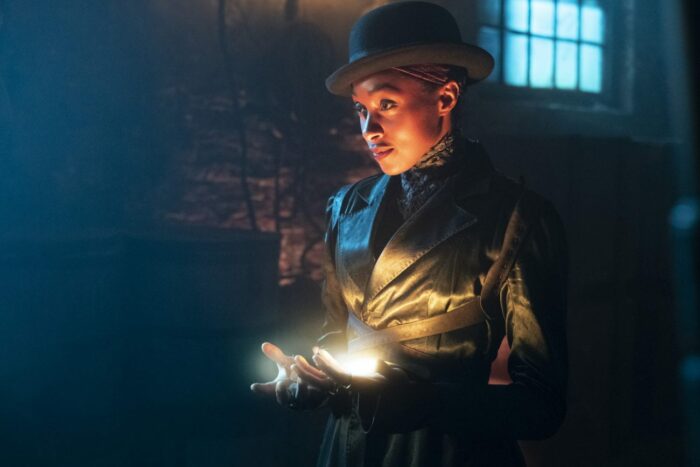
The man who kills Mary, with the machine gun arm, we last saw with Maladie at the opera house in S1E1. So, is Maladie behind this act of violence? I suppose that would make sense, given her hatred for Mary’s song, but again I found myself wondering if Lavinia was involved, because surely she must be doing something nefarious after Amalia tells her about discovering the house that she was using to lure subjects for Dr. Hague. But I suppose that may come later.
Annie resists Amalia’s attempt to bring her into the fold at the beginning of S1E3 but arrives at the end with a bunch of others, apparently drawn by Mary’s song. Or perhaps it is her murder that changes Annie’s mind—as she heard the song back in S1E1—but it still isn’t easy to track her motivation. There is something of a lack of character work here, as Bonfire Annie feels a bit more like a cardboard cutout than a person.
It’s unfortunately the same with regard to Mary. Presenting her as a symbol of hope and then striking her down this early on should have been powerful—enough so that it still almost was—but we were hardly given enough to feel like we knew her prior to her death, and so this falls a bit flat. It is sad that a young woman died, but since we don’t know how she factored into Amalia’s plans, or what those plans are beyond helping the Touched in a general way, or feel a real connection to her as a human being with a rich inner life, I couldn’t help but feeling like I didn’t quite care as much as I was supposed to.
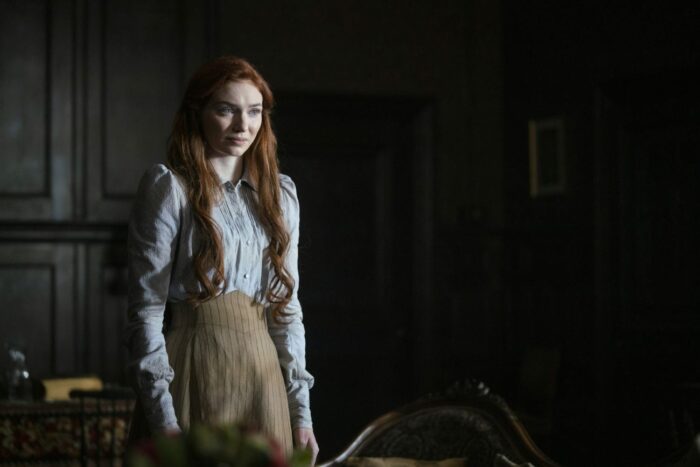
Exiting S1E3, The Nevers feels a bit of a jumble. The title—“Ignition”—suggests that this is the beginning of the real action, which is to come. It all seems to happen too fast, and I fear that what has truly begun is a flattening of the narrative and the characters that fill it—a removal of ambiguity in the service of plot.
I hope that is not the case, and that The Nevers finds its footing in S1E4. We’ll find out next week.

